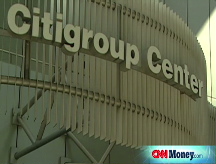Wall Street cheers Citi rescue
The government's bailout of Citigroup sent its stock and major indexes soaring. But the plan fails to silence all skeptics.
 |
| Shares of the embattled bank surged Monday after a week of bruising losses. |
NEW YORK (CNNMoney.com) -- It may be too early to tell just how effective the government's rescue of Citigroup will be -- but for one day at least, regulators got high marks for their efforts from Wall Street.
Shares of Citigroup recouped much of last week's painful losses, gaining 58% Monday following Sunday night's news of the government's sweeping plan to prop up the ailing bank, which has been hit hard due to concerns about its exposure to troubled mortgage-related assets.
The bailout helped lift the broader market higher as well, with the Dow Jones Industrial average finishing nearly 5% higher. Citigroup is a component of the Dow
A number of industry analysts who cover Citigroup appeared encouraged by the news and suggested that the plan was well conceived.
"[The] government program is about as much as we could have hoped for," UBS analyst Glenn Schorr wrote in a note Monday.
Another analyst praised the move since it should help keep Citigroup from becoming insolvent and offer a sense of security to clients and customers of the bank who might have been thinking of cutting ties with Citigroup after last week's nosedive.
"The best benefit we see to the new Citi plan is that other large banks should now have an incrementally stronger counterparty," veteran bank analyst Mike Mayo of Deutsche Bank wrote in a research note.
Under the two-prong rescue plan, the government will cover losses against more than $300 billion in troubled assets on Citigroup's books. Citigroup will absorb the first $29 billion in losses with the remainder covered by the U.S. government.
At the same time, the Treasury Department will make a fresh $20 billion investment in the bank in exchange for preferred shares. The government has already injected $25 billion into Citigroup as part of the $700 billion bailout passed by Congress in October.
Although some analysts hailed the government's plan as one that will potentially stave off further market turmoil and another shock to the U.S. economy, many were uneasy about the program.
Because the company issued additional shares in the form of preferred stock to the government, existing shareholders' stake in the company once again dwindled in value. In addition, dividends on Citigroup stock were cut to just a penny per share for the next three years.
The deal is expected to face scrutiny by Congressional lawmakers as well. Sen. Christopher Dodd, D-Conn., who serves as chairman of the Senate Banking Committee, issued a statement Monday saying he looked forward to "reviewing the details of the plan."
House Democrats were already showing signs of frustration that the Treasury Department continued to allocate money from the $700 billion Troubled Asset Relief Program into companies like Citigroup, while neglecting everyday Americans that are struggling to stay in their homes.
"It is essential that TARP funds be used immediately to fund mortgage foreclosure relief," said House Financial Services Chairman Barney Frank, D-Mass. in a statement Monday.
Some experts have argued that the move to rescue Citigroup is also effectively a snub to Detroit automakers, who pled their case for a $25 billion loan on Capitol Hill last week.
And taxpayers have reason to be concerned too. It could be years before the $700 billion invested in banks as part of the bailout program will pay off, if ever.
One encouraging element of the Citigroup rescue plan is that it could serve as a template for other large banks should they find themselves on the brink of collapse.
Lawmakers in recent weeks have pushed Treasury Secretary Henry Paulson to follow through with his original plan for the bailout program by buying troubled assets from banks. That plan, however, has been bogged down by issues related to pricing and which banks get priority.
Jaret Seiberg, a financial services analyst at the Stanford Group, said that the Citigroup program could serve as an alternative means for banks to cope with problem assets on their books.
"The government has now created a mechanism to stabilize mega financial institutions," Seiberg wrote. "The road map here is for a large financial institution to wall off its worst assets." ![]()


